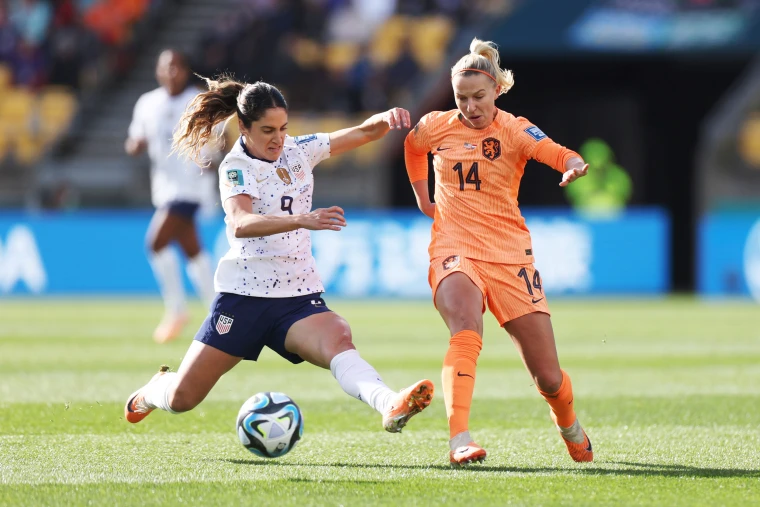The NCAA Womens Soccer Championship stands as a pinnacle of excellence in collegiate sports, showcasing the talent, skill, and determination of female athletes on the soccer field. As part of the National Collegiate Athletic Association (NCAA), the women’s soccer tournament has become a platform for aspiring athletes to shine and compete at the highest level of collegiate competition. In this article, we delve into the history, impact, and significance of NCAA Women’s Soccer, highlighting how it has empowered female athletes and contributed to the growth of women’s soccer in the United States.
The Evolution of NCAA Women’s Soccer
The roots of women’s soccer in college sports can be traced back to the early 1970s when the passage of Title IX, a landmark federal law, opened doors for greater gender equity in educational programs, including sports. Title IX mandated equal opportunities for female athletes, leading to the establishment of women’s soccer programs at colleges and universities across the United States.
In 1982, the NCAA officially recognized women’s soccer as a championship sport, laying the groundwork for what would become one of the most prestigious collegiate tournaments. The NCAA Women’s Soccer Championship began in 1982, featuring just 12 teams, and has since grown in scale and significance, attracting top talents from all corners of the country.
The Road to Excellence: NCAA Women’s Soccer Tournament
The NCAA Women’s Soccer Championship is a testament to the high level of competition and talent in collegiate soccer. The tournament features teams from Division I, II, and III colleges and universities, culminating in a knockout-style format that leads to the crowning of the national champion. Each year, the best women’s soccer teams compete for the coveted trophy, showcasing their skills, teamwork, and dedication on the field.
The championship tournament has become a breeding ground for future stars in women’s soccer. Many players who excel in the NCAA go on to represent their country in international competitions, including the FIFA Women’s World Cup and the Olympic Games. The NCAA Women’s Soccer Championship serves as a stepping stone for athletes to pursue professional careers and compete at the highest level of the sport.
Empowering Female Athletes through Collegiate Soccer
NCAA Women’s Soccer has been instrumental in empowering female athletes and fostering their personal and athletic growth. The collegiate environment provides athletes with opportunities for academic and athletic development, allowing them to balance their passion for soccer with their pursuit of education.
Participation in NCAA Women’s Soccer also instills important life skills in student-athletes, such as discipline, time management, leadership, and teamwork. Female athletes learn to navigate challenges both on and off the field, building resilience that serves them well in their future endeavors.
Additionally, the visibility and recognition that come with competing in NCAA Women’s Soccer provide female athletes with a platform to inspire the next generation of young girls. By being visible role models, these athletes break down barriers and demonstrate that women can excel in sports and academics simultaneously.
Elevating Women’s Soccer in the United States
NCAA Women’s Soccer has played a crucial role in elevating the profile of women’s soccer in the United States. The championship tournament draws significant media coverage and attracts large audiences, generating excitement for women’s soccer at the college level.
The collegiate soccer experience also acts as a feeder system for the National Women’s Soccer League (NWSL), the top professional women’s soccer league in the United States. Many NCAA Women’s Soccer alumnae go on to have successful careers in the NWSL, further fueling interest and investment in women’s soccer.
Moreover, NCAA Women’s Soccer has contributed to the development of youth soccer in the country. The visibility of collegiate soccer inspires young players to pursue their dreams of playing at the college level, leading to an increased talent pool and a higher standard of play in youth soccer programs.
Building a Culture of Inclusivity and Diversity
NCAA Women’s Soccer has also been instrumental in promoting inclusivity and diversity in the sport. The championship features teams from various regions, representing diverse backgrounds and cultures. This diversity enriches the collegiate soccer experience and promotes an inclusive environment that fosters mutual respect and understanding.
Furthermore, the NCAA has taken strides to promote gender equality by offering the same resources and support to women’s soccer programs as their male counterparts. This commitment to equity ensures that female athletes receive the same opportunities and resources as male athletes, contributing to the overall growth and success of women’s soccer in the United States.
Conclusion
The NCAA Women’s Soccer Championship stands as a testament to the passion, talent, and determination of female athletes competing at the collegiate level. The tournament has become a breeding ground for future stars in women’s soccer, empowering athletes and fostering personal and athletic growth.
NCAA Women’s Soccer has been instrumental in elevating the profile of women’s soccer in the United States, drawing media coverage, and inspiring young players to pursue their dreams. The collegiate soccer experience instills essential life skills in student-athletes and provides them with a platform to inspire the next generation.
As NCAA Women’s Soccer continues to evolve and grow, it will play a crucial role in promoting gender equality and building a culture of inclusivity and diversity in sports. The impact of the championship extends beyond the college campuses, contributing to the overall growth and success of women’s soccer in the country.
NCAA Women’s soccer stands as a powerful testament to the immense talent, dedication, and passion of female athletes in the United States. It has evolved from humble beginnings to become a prominent platform for women’s sports, providing opportunities for players to showcase their skills, pursue higher education, and compete at the highest level.
The growth and success of NCAA Women’s soccer have not only elevated the sport but have also contributed to the advancement of women’s athletics as a whole. The increasing popularity of women’s soccer has opened doors for young girls to dream big and aspire to be professional athletes, fostering a new generation of empowered and determined players.
Throughout the years, NCAA Women’s soccer has witnessed thrilling matches, fierce rivalries, and unforgettable moments that have captivated fans and inspired millions. The dedication of coaches, the support of fans, and the determination of players have created an atmosphere of excellence and camaraderie, exemplifying the power of teamwork and sportsmanship.
The emphasis on both academic and athletic achievements in NCAA Women’s soccer underscores the importance of well-rounded development for student-athletes. Through the balance of rigorous academics and competitive sports, players are equipped with essential life skills such as time management, resilience, and leadership that extend beyond the soccer field.
Furthermore, NCAA Women’s soccer has paved the way for greater gender equality in sports. The success of female athletes has shattered stereotypes and challenged societal norms, proving that women are equally capable and deserving of recognition and support in the athletic arena. As more opportunities are created, more women are inspired to pursue careers in coaching, administration, and other roles within the sporting world, breaking down barriers and driving progress.
The impact of NCAA Women’s soccer extends far beyond the campus and into society. Female athletes serve as role models for young girls, instilling in them a belief in their own potential and the value of hard work. The sport’s popularity also contributes to broader conversations about gender equality, representation, and the importance of providing equitable opportunities for women in all aspects of life.
In the future, NCAA Women’s soccer is poised to continue its growth and influence. With the ongoing efforts to expand the sport’s reach, improve facilities, and increase media coverage, the platform for women’s soccer is becoming more robust than ever before. As it gains further recognition and support, the impact of NCAA Women’s soccer will only continue to flourish.
As we celebrate the achievements of NCAA Women’s soccer, we must also recognize the work that remains to be done. Continued advocacy for women’s sports, equal funding, and media representation are crucial to ensuring that female athletes receive the recognition and support they deserve.
In conclusion, NCAA Women’s soccer has proven to be a force of empowerment, breaking barriers, and inspiring a generation of female athletes. Through their talent, determination, and love for the game, these athletes have shown that they can compete at the highest level and succeed in both academics and athletics. Their achievements serve as a reminder that women’s sports are not only here to stay but also to thrive.
As we look ahead, NCAA Women’s soccer will continue to be a beacon of hope and inspiration for aspiring female athletes, as well as for fans who see the potential of women’s sports to effect positive change in society. With continued support, recognition, and investment, NCAA Women’s soccer will undoubtedly continue to soar to new heights, leaving a lasting legacy for generations to come.
NCAA Womens Soccer stands as a shining example of how collegiate sports can empower female athletes and contribute to the growth of women’s soccer. The tournament showcases the best of women’s collegiate soccer, inspiring the next generation of young players and promoting gender equality in sports. As the championship continues to evolve, it will play a pivotal role in shaping the future of women’s soccer in the United States and beyond. Click here



